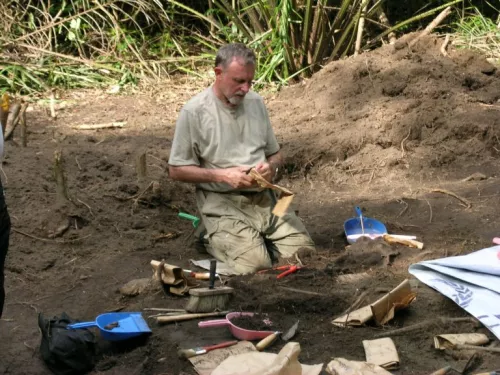In Memory of William D. Haglund, PhD

It is with great sadness that we announce the passing of Bill Haglund, an exceptional forensic anthropologist and humanitarian. Bill was born in Duluth, MN, in 1943 and spent much of his childhood with his grandparents in Baker, OR. While he was in his late teens, his mother was stabbed to death in a Duluth bar. He would later talk of his mother's killing as an impetus for his calling. He went through incredible hardships and had to work from a very young age. One of his jobs was at a funeral home and, after he finished high school, he went on to attend the California College of Mortuary Science. This was followed by a bachelor's degree in biology from UC Irvine.
In 1979, Bill moved to Washington state and began work as a death investigator with the King County Medical Examiner's Office. He was Chief Investigator there from 1983 to 1995. Under Dr. Don Reay's leadership, Bill would play a role investigating some of the most tragic chapters in the region's history, among them the Wah Mee Massacre and the Green River serial murders. While working at the Medical Examiner's (ME's) Office, Bill earned a PhD in physical anthropology in 1991 from the University of Washington under the mentorship of Daris Swindler.
In the early 1990s, he started working in the field of human rights as an anthropology consultant for investigations in Bosnia, Croatia, Guatemala, Honduras, and Rwanda. His introduction to this field ended up being a catalyst for his future career. He left the ME's Office in Seattle in 1995 to become a senior forensic advisor to the United Nations' International Criminal Tribunals, documenting mass killings in the former Yugoslavia and Rwanda. In 1998, Bill began serving as Director of Boston-based Physicians for Human Rights' international forensic program, a position that he held for eight years. His work took him to Afghanistan, Iraq and East Timor, Sierra Leone, Somaliland, Sri Lanka, Grenada, Abkhazia, Cyprus, Nigeria, and many other locales ravaged by armed conflict and human rights violations.
Bill was a Fellow of the American Academy of Forensic Sciences and a member of the Anthropology Section. He was active during his early career in death investigation training. He served as President of the Washington Association of Coroners and Medical Examiners 1991-1994 and was the Investigator Affiliate Member to the Board of Directors of the National Association of Medical Examiner from 1989 to 1995. He published several articles on death investigation and was co-author of the 1996 Jentzen et al. Medicolegal Death Investigator Training Manual.
His best-known academic contributions involved forensic taphonomy, the scientific study of decomposition processes. He contributed several articles on marine and terrestrial taphonomy to the Journal of Forensic Sciences and co-edited two books on this topic in collaboration with Marcella Sorg. Since then, forensic taphonomy has become a foundational subtopic of forensic anthropology. The Anthropology Section awarded Bill the T. Dale Stewart award in 2013 recognizing his lifetime achievements in taphonomy and human rights work.
Bill will be remembered by his friends, students, and colleagues for his compassion, sense of humor, his love for animals and music, and most of all for his unparalleled work ethic. Working with Bill Haglund was a learning experience in itself, which inspired many young scientists and transformed their lives. He will be missed by all those who were lucky enough to cross his path.
The views and opinions expressed in the articles contained in the Academy News are those of the identified authors and do not necessarily reflect the official policy or position of the Academy.